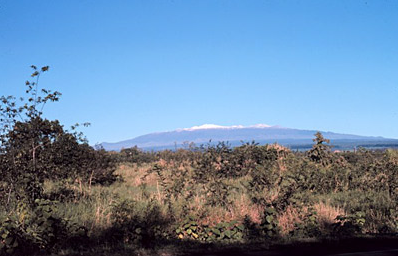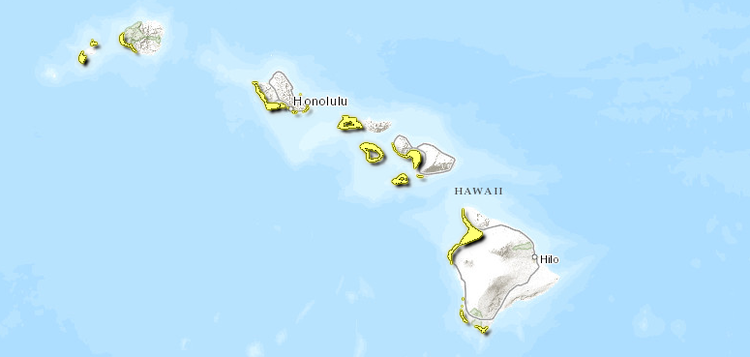Hawaii tropical low shrublands
Biodiversity Features
Coastal and lowland dry shrublands occur on the lowest leeward slopes of the higher Hawaiian Islands, and on all but the summit regions of the islands of Lana’i, Kaho’olawe, and Ni’ihau. This ecoregion also includes the terrestrial portions of all of the northwestern Hawaiian Islands, mostly comprised of atolls and small basalt remnants. Vegetation includes grasslands of Eragrostis, Fimbristylis, Sporobolus, and Lepturus, and mixed shrublands dominated by one or more of Sida, Dodonaea, Scaevola, Heliotropium, Gossypium, Chamaesyce, Chenopodium, Myoporum, Vitex, Anthium, and Styphelia. Non-tree plant diversity of this ecoregion is high (more than 200 species) and highly endemic (more than 90% endemic). Tree diversity is relatively low.
Current Status
Over 90 percent of the Hawaiian tropical low shrublands have been lost to development or displacement by alien vegetation (Invasive species). Small, degraded examples of the natural communities of the ecoregion remain. Kaho’olawe Island is a natural/cultural reserve, and Mo’omomi Preserve on Moloka’i is managed by The Nature Conservancy of Hawaii. The northwestern Hawaiian Islands comprise a USFWS refuge.
Types and Severity of Threats
Fire, weed invasions, feral animals (especially goats and deer), and continued development threaten this ecoregion.
Conservation Partners
- Hawaii Natural Heritage Program
- The Nature Conservancy
- The Nature Conservancy of Hawaii
Justification of Ecoregion Delineation
The Hawaiian tropical low shrublands encompasses a portion of Küchler’s unit 1 (Schlerophyllus forest, shrubland, and grassland). Omernik did not classify Hawaii, and Bailey clumped all of Hawaii into one unit.
Additional Information on this Ecoregion
- For a shorter summary of this entry, see the WWF WildWorld profile of this ecoregion.
- To see the species that live in this ecoregion, including images and threat levels, see the WWF Wildfinder description of this ecoregion.
- World Wildlife Fund Homepage
| Disclaimer: This article is taken wholly from, or contains information that was originally published by, the World Wildlife Fund. Topic editors and authors for the Encyclopedia of Earth may have edited its content or added new information. The use of information from the World Wildlife Fund should not be construed as support for or endorsement by that organization for any new information added by EoE personnel, or for any editing of the original content. |

